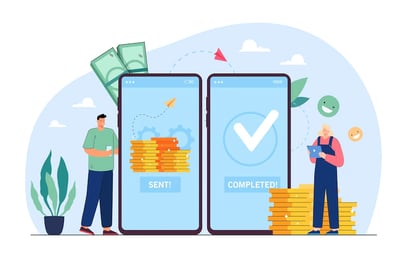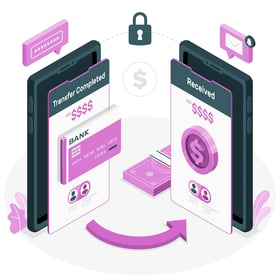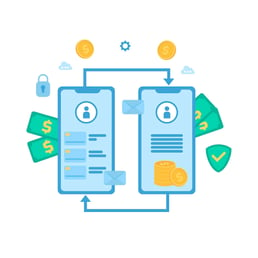Payment Processing vs Payment Gateway
Nowadays, online sales are expanding. Due to the pandemic, companies have adjusted to a more digital way of selling. They are now exploring ways for cashless purchases. According to the American Express Digital Payments survey, 71% of merchants agree that their yearly online and mobile sales have increased. As a company, how are you managing this shift?
You need suitable systems and procedures for selling services online. Also, it is not easy to locate and strategically choose a payment processor when you're new to the world of virtual businesses. Here are some questions you might be looking for the answers to:
- What is a merchant account? How to set up a merchant account?
- What is a payment processor, and how does it differ from a payment gateway?
- What are the payment methods that my business offers to its customers?
A payment processor facilitates the transaction processing between a merchant and a customer. A payment gateway is a component of the payment processor that enables a merchant to accept customer payments. In this article, you'll learn the differences between these two and what each one does.
What Is a Payment Processor?
A payment processor facilitates the transaction processing between a merchant and a customer. They are responsible for verifying that the customer has the necessary funds to complete the purchase, also, of approval or decline of the transaction. They perform a crucial function in transaction processing, which means that they have to be secure.
A payment processor handles electronic payments for merchants. They are responsible for authorizations, settlements, and funding of transactions.
There are many different payment processors. Despite they all have one thing in common. They facilitate the process of accepting and managing electronic payments. This can include everything from credit and debit cards to e-checks and even cryptocurrencies.
How does the Payment Processor work?

When a customer makes a purchase, the payment gateway technology processes the transaction and forwards it to the payment processor. The processor then contacts the customer's bank to confirm if the funds are available and transfer the money to the merchant's account.
This allows business owners to focus on their business without managing complex financial transactions. Payment processors typically charge a small transaction fee for their services. It is generally passed on to the customer as a higher price for goods or services.
Some of the key tasks performed by a payment processing company include:
- Managing credit card discounts
- Managing billing disputes
- Managing cash flow
- Increasing merchant sales by increasing conversion and reducing handling fees
- Processing online and in-store purchases
- Monitoring and analyzing merchant activity
- Generating invoices for merchants
- Reconciling bank accounts
- Maintaining compliance with PCI and other payment processing regulations
- Monitoring cash advances for merchants
- Contacting customers after they've paid
What Is a Payment Gateway?

Payment gateway technology is an e-commerce application service provider that authorizes accepting credit card payments for online retailers and mobile applications. It is the equivalent of a physical point of sale(POS) terminal located in most retail outlets but online.
The payment gateway facilitates the transfer of information between the payment portal (a website, mobile phone, or IVR system) and the Front-End Processor or acquiring bank.
Payment Gateways mediate between customers and vendors they purchase goods or services. They provide the service of processing information entered upon purchase, checking for authorization, or completing transaction processing. They're also used in larger retail stores.
So, what is the main difference between the payment processor and the payment gateway? In short, a payment processor handles the behind-the-scenes work of authorizing and approving credit card transactions. In contrast, payment gateway technology provides the interface that allows customers to make those transactions on your website or mobile app.
Why Use a Payment Gateway
An increasing number of businesses are moving to online transactions and virtual stores, which means that more and more money is being processed via online credit cards. Since it's typically cost-prohibitive to have a physical presence at many credit card companies and banks, most businesses opt to go with a third-party payment gateway company.
A Payment gateway helps encrypt sensitive information, such as credit card information, to ensure that information passes securely between the customer and the merchant. They make every effort to meet the specific safety and other criteria associated with electronic transaction processing. In addition, a payment gateway can provide additional security features such as fraud detection and data backup.
The tasks that a payment gateway performs include
- Managing credit card discounts
- Managing billing disputes
- Increasing merchant sales by increasing conversion and reducing handling fees
- Processing online and in-store purchases
- Monitoring and analyzing merchant activity
- Generating invoices for merchants
- Reconciling bank accounts
- Maintaining compliance with PCI and other payment processing regulations
- Monitoring cash advances for merchants
- Contacting customers after they've paid
Gateway saves you valuable time, and they work as a business owner. When you utilize a gateway, you do not have to enter the payment info received on your site manually. Payment gateways also provide exceptional flexibility in the types of payments your customers can use.
With a bit of flexibility, you can increase sales among your customers while opening up your shop for new customers who take care of their financial obligations. This will drive your sales to the next level.
Did you know that 69% of customers tend to abandon their carts because there aren't any payment options? It's true! Offering multiple payment options is a great way to prevent the number of deserted or missing carts from going up. That's why offering customer payment flexibility is vital for your company's success.
Types of Payment Gateways
Now that you know the primary difference between payment gateway and payment processing, let’s talk about the types of payment gateways.
Traditional Payment Gateways
A traditional gateway helps merchants to accept payments online for products and services. With a payment portal, financial information is most often:
- Entered when making a purchase on an eCommerce website. It can also be entered by means of a hosted payment form or by mobile application, depending on how the payment process is configured.
- Customers typically enter their information into a virtual terminal.
Digital Payment Gateways
Payment gateways have expanded beyond the web. In recent years, it has created an easy-to-use buying experience for all channels, regardless of the industry.
Besides what a traditional payment gateway is able to provide you with, online payment gateways can be used to go beyond that:
- Point of sale (POS) or mobile device processing can be handled easier with in-store purchases.
- Integrate with existing systems that merchants and customers both use efficiently.
- Accept NFC transactions using near-field communication (NFC) technology.
Interconnection of Payment Processors and Gateways

Finding something we like on a site using a simple search is easy. Click it, and checkout with no problem. A lot is going on behind the scenes. Here is a step-by-step breakdown of what happens during a purchase:
- The payment processor notifies the card-issuing bank. Then the transaction processing is either approved or rejected.
- The payment processor returns a response such that the payment system has approved or rejected the charge.
- The person initiating the transaction is notified concerning the result of the transaction processing by the payment gateway.
- The funds are deducted from the customer's account and sent to the merchant's bank account if approved.
- Then, merchants can upload transactions over and over individually or in stacks.
In addition to all that, real-time communication from the gateway is encrypted. That provides additional security to the process, too.
Primary Difference Between the Two
These two are alike, like two peas in a pod. You need both to run a successful business and accept payments. Payment processors are like the post office, while payment gateway is like private courier services. Both will get your payments where they need to go.
Payment processors work behind the scenes by securely routing data to and from the different parties during the course of the money transfer process, from the initiation of the fund transfer to their deposit to your bank account. It provides facilitation for transaction processing.
A payment processor is a tool that transmits the status or rejection of transaction processing between the business and customers.
A Suitable Payment Processor
Looking for a payment processor may look like a challenging task. There are several choices out there; all claim they're the best way to run your business. You want to make sure this choice is made carefully, as it affects your clientele as well.
Finding a company that handles different payment types is vital when choosing a business. Which include cash acceptance, accept credit cards and digital wallets.
Other considerations for choosing the right payment processor include the following:
- Cost / Fees
- Lower fees are always preferable!
- Existing bank-related processors can raise fees, ultimately affecting your bottom line.
- Security
- Integrations and third-party services
- Customer Support
- A product that can grow with you
Determining which payment processing service is the best for your company will make it simpler to make payments. Check out ZarMoney today to learn more about how we can support you in accepting payments from your customers.
Conclusion
As business owners, it's essential to understand the key differences between a payment processor and a payment gateway. While they may seem like similar services, they serve different purposes.
A payment processor handles the financial transaction processing between a merchant and a customer. A payment gateway, on the other hand, allows businesses to accept online payments.
So, which one do you need? Now that you know the difference between these two payment methods. Try out our free trial now so that you can make the best decision for your business.

